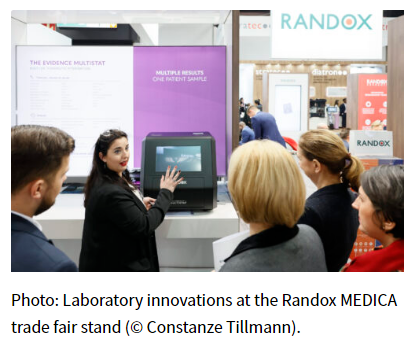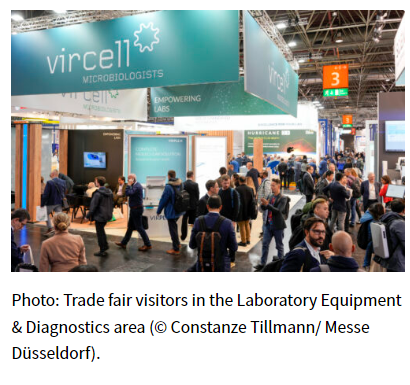“Lab 4.0”, shortage of skilled personnel, incentives for major disease complexes and a look ahead
What are the most exciting developments in medicine right now? At MEDICA in Düsseldorf, the world’s leading trade fair for the healthcare business and the medical technology industry, the professional forums and their accompanying stage programme at the heart of this year’s trade fair (11–14 November) will take a deeper look into these developments, for example in the fields of health IT, trends in medical technology, healthcare policy and laboratory medicine. With its informative short lectures and professionally grounded panel discussions, the MEDICA LABMED FORUM has become one of the main attractions of the MEDICA accompanying programme in recent years.
With a view to this year’s thematic focus, Prof. Stefan Holdenrieder of the German Heart Centre in Munich (DHM), who is the Scientific Director of the MEDICA LABMED FORUM, points to the trend towards massive digitalisation and networking as well as big data applications and artificial intelligence (AI), currently summarised under the heading “Lab 4.0”. “We have so far mainly considered individual lab results. In future we will analyse more and more complex data patterns using machine learning and aggregate them as complex diagnostic scores. Lab medicine is currently evolving from a purely analytical discipline in the direction of data science. In this process, interdisciplinary collaboration between laboratory technicians and specialised data scientists, especially computer scientists and biostatisticians, is becoming increasingly important.”

Day 1: Shortage of skilled personnel and digitalisation
On the opening day of MEDICA 2024 (11 November), the MEDICA LABMED FORUM will focus on the highly topical subject of digitalisation and AI, headed by Prof. Thomas Streichert (MD), University Hospital Cologne. The morning session will be dedicated to the shortage of skilled personnel, which is the most pressing problem for laboratory medicine according to recent surveys. As Head of the Young Laboratory section of the German Society for Clinical Chemistry and Laboratory Medicine (DGKL), Dr Ronald Biemann of the University of Leipzig Medical Center will report on the shortage, in some cases dramatic, of future personnel in the medical and medical-technical fields. In the panel discussion, the speakers will explore solutions to the crisis with the help of automation and digitalisation.
In the afternoon, the focus will be on AI and big data tools that are already available or still under development. Image recognition using deep learning is already state-of-the-art for the automated analysis of leucograms, while machine learning based on large multivariate data sets that occur every day in laboratory diagnostics is still at a developmental stage. The exciting question of how large language models can help to make abstract laboratory findings more understandable and whether AI really makes us smarter (or possibly dumber) will also be discussed.
Day 2: Trends in cardiology and oncology
Traditionally, on the second day of the trade fair Prof. Stefan Holdenrieder leads a discussion on current developments in laboratory medicine for the two disease complexes most driving mortality in the Western world, cardiovascular diseases and cancer. This year, the cardiology focus is on congenital heart defects. They can increasingly be corrected surgically in childhood and also play a growing role in adult medicine due to improvements in life expectancy. Lecturers from the German Heart Centre and the Technical University of Munich will shed light on the topic from a clinical perspective, and mathematician Prof. Frank Klawonn of the Helmholtz Centre in Brunswick, a visiting researcher at the Heart Centre, will demonstrate possibilities for modern data evaluation using machine learning.
In the afternoon the topic of highly sensitive cancer diagnostics of blood is on the agenda. With this examination technique, known as the “liquid biopsy”, lab medicine opens up completely new avenues in oncology to monitor tumour progression more closely than is possible with conventional tissue biopsies. This allows early detection of when a treated cancer will flare up again and require a change in treatment. New methodological approaches such as the analysis of methylation profiles for early detection of hereditary forms of cancer or single-cell analysis using microfluidics will be discussed.
Day 3: Future prospects for laboratory medicine
On the Young Scientists’ Day of the MEDICA LABMED FORUM, the next generation of researchers present their perspective on the future of laboratory medicine. As an introduction, university lecturer Dr Verena Haselmann (MD) of the University Medical Centre Mannheim will give an overview of the most recent progress in the field and obstacles that still need to be overcome. Wearables for the continuous recording of diagnostic parameters are one such new opportunity, while new quality requirements and the shortage of skilled personnel are some of the obstacles. In the afternoon, the discussion will focus on personalised therapy based on individual patterns of laboratory parameters, the interdisciplinary synergy of laboratory and imaging in integrated diagnostics and the use of artificial intelligence.

Day 4: Healthy ageing
The final day of the forum traditionally focuses on diagnostic research institutes and companies that want to open the door to new fields of application in lab medicine. Both sessions will be led by members of the German Diagnostics Industry Association (VDGH), Dr Kai Prager and Dr Peter Quick. Their topic for 2024 is research on ageing from the perspectives of pathophysiology, diagnostics and treatment. The latest findings on the genetic and epigenetic biological clock, protein misfolding and aggregation as the basis of neurodegenerative diseases like Alzheimer’s and Parkinson’s and the role of gut microbiota during strokes are some of the topics that will be discussed.
As the "grand finale", interesting theories and practical experiences in how to slow the ageing process will be discussed in the afternoon. Prof. Emrah Düzel of the University of Magdeburg will present various anti-ageing drugs, Prof. Wolfram Ruf of the University of Mainz will describe the effects of anti-inflammatory agents, Prof. Dres. Monique Breteler of DZNE, the German Centre for Neurodegenerative Diseases, will hold a talk about the influence of the environment on ageing in the central nervous system and Prof. Claire Jacob, also of the University of Mainz, will discuss possibilities to repair lesions in the nervous system.
At present about 6,000 companies have booked a spot at MEDICA 2024 and COMPAMED 2024, the supplier trade fair held in parallel (from 11–14 November). In the year before, both events recorded a total of 83,000 visitors.
Source & Image Credit: Medica






